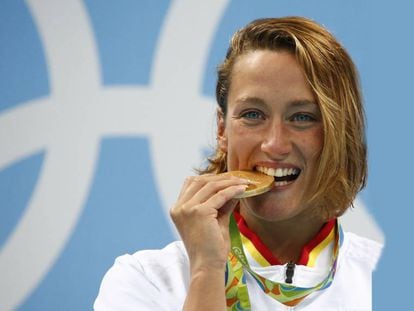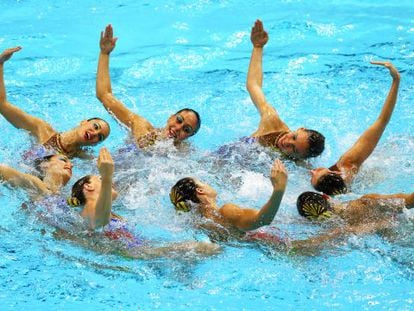Why female athletes in Spain are banned from getting pregnant
Contracts for sportswomen often contain a clause restricting motherhood, but no one will speak out

“In Spain, the Sports Law enshrines certain rights for men, and only men, that are not granted to women. By law, women cannot be professional sports players, given that only male leagues enjoy professional status.” María José López, a lawyer from the Association of Female Basketball Players (AJUB), sums up pithily the reason why she believes Spanish sportswomen are doubly discriminated against.

As she explains, not only are they subject to the sexism that all women suffer in Spain, but they are also subjected to other kinds of discrimination as athletes. Furthermore, she says, the Spanish government does not seem particularly concerned.
The most visible form of discrimination faced by sportswomen in Spain is the so-called “anti-pregnancy clause,” which allows soccer and basketball clubs to terminate the contract of a player should they fall pregnant, with no right to compensation.
Clubs have the right to terminate contracts should female athletes fall pregnant, with no right to compensation
Given the climate of silence and fear among women playing in the amateur leagues in Spain, no one knows for sure how many have such clauses in their contracts. “I found three contracts of this type when I was dealing with several cases of non-payment,” López explains. “On the quiet, they tell me that there are a lot more, but that no one dares to report them.”
“In legal terms, these clauses are completely void,” explains José Ramón, Secretary of State for Sport, and the man responsible for responding to proposals in Spain’s Senate by parties such as Cuidadanos urging the government to amend the law and ban such clauses from sports contracts. “We can’t do anything about them, they are a labor law issue,” he adds. “If they were presented to a labor tribunal, anyone would win the case. They are not included in any sports law, so there is no regulation change that we can make. It is only if people report them can we do something to help those affected.”
For María José López, the state can and should intervene: “Just regulating professional sport and including female leagues would give women protection against these clauses,” she argues.
“Professional sport requires a union and a collective agreement that is respected by all. And the contracts should be signed with a copy for all parties: they shouldn’t be private contracts like they have been up until now,” she adds.
López chose these clauses as her rallying cry for this battle because they are the most notable aspect of discrimination. But there are others. “The lack of collective agreements also means that sportswomen do not enjoy the same rights as men in the case of incapacity, non-payment, revenue from betting…”
Professional sport requires a union and a collective agreement that is respected by all
Amaya Valdemoro has played basketball in Spain, Russia and in the WNBA, the professional women’s league in the United States. “The WNBA forms part of the NBA and there is clearly a difference between there and Spain,” she says. “There, according to the collective agreement, a sportswoman has it in writing that she has the right to get pregnant and that the club is obliged to keep her on contract. That said, there is still discrimination. A sportswoman who decides to have a child knows she is running a huge risk. The team will respect her contract, but one or two years later either they will not re-sign her or they will cut her wages because they consider her performance to have fallen off.”
So far, no Spanish sportswomen have come forward to take up the fight, something that Ana Muñoz, the former head of the government’s National Sports Council (CSD), understands perfectly. “You can’t impose this double pressure on female athletes,” says Muñoz. “On the one hand, they are forced to keep quiet so that they can keep working, and on the other, we are demanding that they report what’s happening so that we can act.”
For Muñoz, the state should not only modify the law to take female athletes into account, but it should also apply preventive measures and carry out inspections. “Depending on the category of the club, this inspection would be the responsibility of the CSD or the respective federations,” she explains.
María José López says she recently met with Jean-Marc Bosman, the Belgian former soccer player who mounted a successful judicial challenge to soccer transfer rules in the 1990s. “He was completely destroyed,” the lawyer explains. “He could barely walk or talk. He is paying for his fight with his health. He won, but all of the teams closed their doors to him. He was finished as a player.”
English version by Simon Hunter.












































